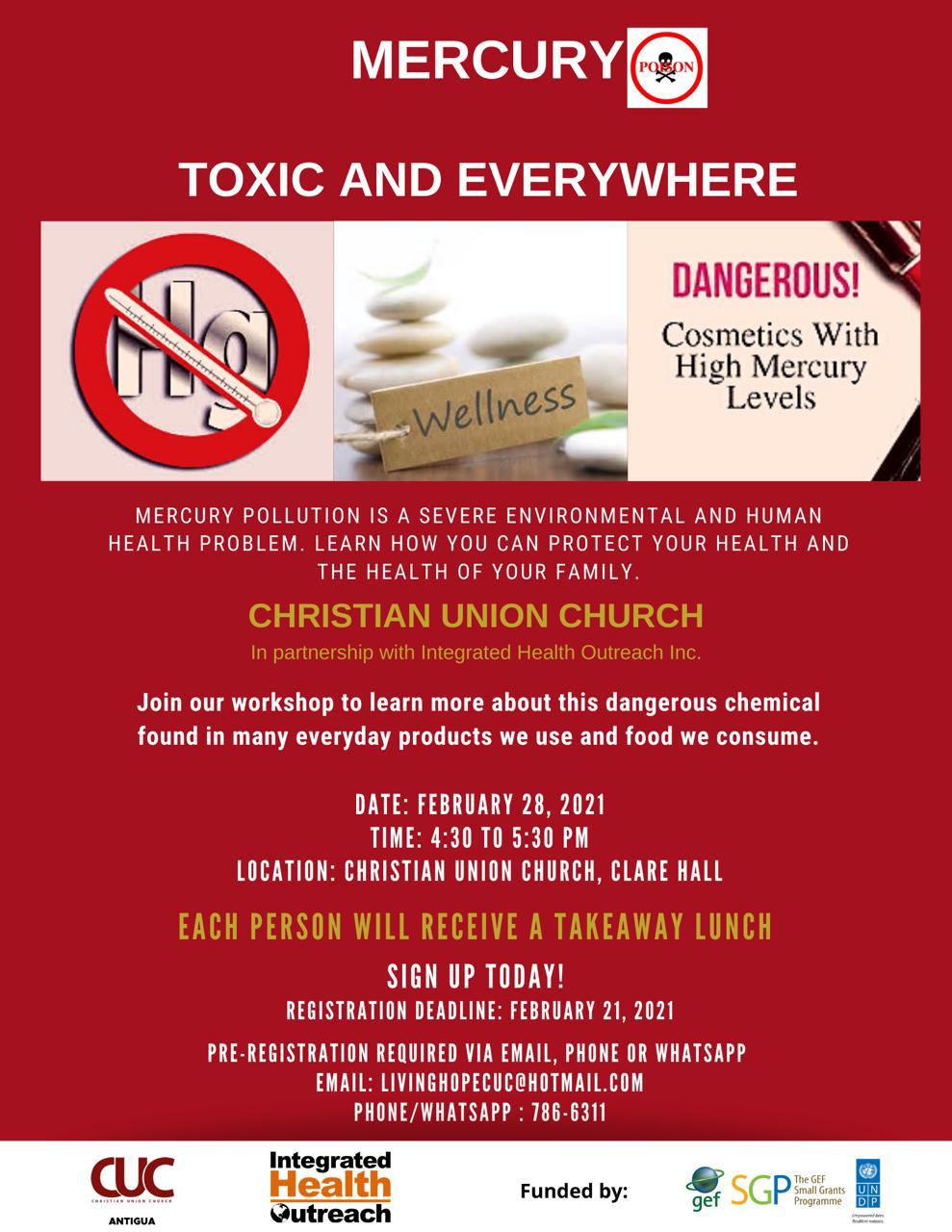Four non-profit organisations in Antigua and Barbuda have embarked on an ambitious campaign to reduce and phase out mercury in the country. Mercury is a highly toxic chemical that over time causes harm to our health and the environment. The Marine Protected Areas Trust (MEPA), the Medical Association of Antigua and Barbuda (MAAB), The Christian Union Church (CUC), and Zero Waste Antigua and Barbuda (ZWAB) have all received funding from the Global Environment Facility/Small Grants Programme to implement the Mercury Phase-out Project – “Contribution Towards Implementation of the Minamata Convention on Mercury, and Phasing-out and Disposing of Mercury Added Products in Antigua and Barbuda”. The project is being spearheaded by Nicola Bird, Ph.D., Executive Director of Integrated Health Outreach (IHO).
Mercury is a ubiquitous element found in foods we eat, particularly larger species of fish and in everyday products that we use. Various appliances, including fluorescent lightbulbs, batteries, thermometers, and light switches, as well as amalgam dental fillings, some skin lightening creams, and other cosmetics, contain mercury. Its negative health impacts cause damage to the central nervous system, thyroid, kidneys, lungs, immune system, eyes, gums, and skin. Persons may suffer memory loss or language impairment, and the damage to the brain cannot be reversed. Children, pregnant women, and women of child-bearing age are particularly vulnerable.
In February 2017, the government of Antigua and Barbuda signed on to the Minamata Convention, a global treaty to protect human health and the environment from the adverse effects of mercury. The focal point for the Convention is Dr. Linroy Christian, Director of the Department of Analytical Services. Dr. Christian is overseeing several initiatives to assist in the reduction and elimination of mercury, from research to the implementation of various projects. The four organisations MEPA, MAAB, CUC, and ZWAB are working closely with Dr. Christian, to create public awareness and bring the population on-board with recommended courses of action. These include:
- Minimising the impact of mercury in the diet by reducing the consumption of those larger species of fish that are more likely to be mercury contaminated. At the same time, it is important to conserve endangered smaller fish. This can be done by consuming the highly invasive lionfish, which is wreaking havoc on Antigua and Barbuda’s marine life. Lionfish has a low to negligible mercury content, is mild in flavour, and can be as deliciously prepared as any other fish.
- Encouraging persons to eliminate the use of mercury-added products and switch to using mercury-free LED lightbulbs, thermometers, blood pressure kits, and electrical switches. The National Solid Waste Management Authority (NSWMA) is also playing a major role in the project, by working in partnership with the four non-profit organisations to initiate a drive for the collection of used fluorescent bulbs, which release mercury if broken. The public will be asked to dispose of its used fluorescent bulbs at select locations where specialised bins will be placed.
- Sensitising persons to the dangers of using mercury-added skin lightening creams and other mercury-added cosmetics, encouraging them to read labels and switch to safer, mercury-free products.
Each person in Antigua and Barbuda can play a significant role in reducing the impact of mercury on their health and environment by making simple shifts in their behaviour. Properly disposing of mercury-added products, reading labels, and making wiser, mercury-free choices in consumables, cosmetics, and foods, will all go a long way in reducing mercury contamination.
The public is encouraged to learn more about mercury and its impact by visiting the following websites: www.mercuryphaseout.com, www.mercuryconvention.org, and www.bcrc-caribbean.org
-ENDS-
Contact:
Brenda Carrott or Adlai Carrott
CHEETAH Communications and Business Solutions
St. John’s, Antigua
Tel: 268-464-9349 / 268-721-6251
Email: [email protected]
